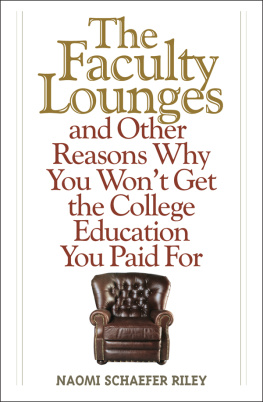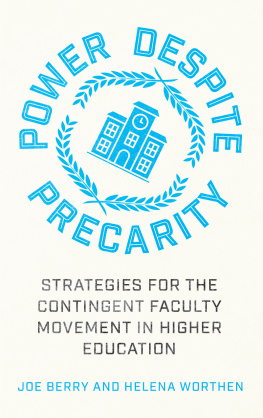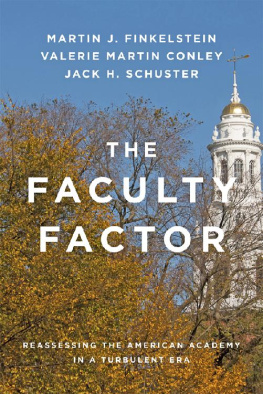The Faculty
Lounges
The Faculty Lounges
and Other Reasons Why You Wont Get the College Education You Paid For
Naomi Schaefer Riley
IVAN R. DEE
Chicago
Published by Ivan R. Dee
A wholly owned subsidiary of The Rowman & Littlefield Publishing Group, Inc.
4501 Forbes Boulevard, Suite 200, Lanham, Maryland 20706
http://www.rowmanlittlefield.com
Estover Road, Plymouth PL6 7PY, United Kingdom
Distributed by National Book Network
THE FACULTY LOUNGES. Copyright 2011 by Naomi Schaefer Riley
All rights reserved, including the right to reproduce this book or portions thereof in any form. For information, address: Ivan R. Dee, Publisher, 1332 North Halsted Street, Chicago 60642, a member of the Rowman & Littlefield Publishing Group. Manufactured in the United States of America and printed on acid-free paper.
www.ivanrdee.com
Library of Congress Cataloging-in-Publication Data
Riley, Naomi Schaefer.
The faculty lounges : and other reasons why you wont get the college education you paid for / Naomi Schaefer Riley.
p. cm.
Includes index.
ISBN 978-1-56663-886-9 (cloth : alk. paper) ISBN 978-1-56663-888-3 (electronic)
1. Education, HigherUnited States. I. Title.
LA227.4.R55 2011
378.73dc22 2010051677
To Mom, Dad, Jason, Emily, and Simon
Preface
First get tenure, then hoist the Jolly Roger. I learned that pearl of pragmatic wisdom, originally offered by the eminent Harvard political scientist Harvey Mansfield, from my father somewhere around the time I was in sixth grade. For my father, a political science professor at a small college in Massachusetts, as for Mansfield, the institution of tenure has allowed him the freedom to be a serious contrarian on his campus. Whether he was giving difficult exams in an era of grade inflation or asking critical questions about the politically correct ideas of the day, tenure meant that he didnt have to risk his familys livelihood to defend what he believed in. It protected him from capricious administrators and angry colleagues, and (in my biased opinion) it gave his students a deeper and more well-rounded education. For the record, I have no doubt that my fatherwho in his childhood was expelled from kindergarten for his defiancewould have spoken his mind either way. But tenure made his principled stance a little less dangerous.
In the academic world, my father was (and is) one of the haves. He made it to a prestigious school in a city in the Northeast and has remained there for almost thirty-five years. My mother was a have not. She moved with him for his tenure-track job when she was pregnant with me, then proceeded to teach at half a dozen different colleges in the area over the next several years. Her job prospects seemed always to be subject to the whims ofand Im being charitable hereunstable departmental personalities.
My parents received their PhDs from the same acclaimed university, but my mother was never offered tenure after she began teaching. Instead, tired of this itinerant academic life, she decided to become an entrepreneur. She saw a need for a think tank devoted to local public policy issues, and she started it. She did the fund-raising, the research, the writing, and, when the time came, the hiring of additional staff. Despite her lack of tenure, she has never been afraid, as they say, to speak truth to power. And there were plenty of times during the past twenty-five years when her think tanks future and her own position were in doubt.
But my fathers tenure meant that there would always be at least one salary coming in.
The effects of tenure on the academic labor market were visible to me in the form of my parents friends too: Couples who were forced into long-distance relationships so that one spouse could maintain a tenured position in the middle of nowhere while the other spouse went to find a job in a different city. Former students of my parents who were pushed off the long (and growing longer) road to a doctoral degree when they stopped to get married and start a family. The men and women who had already lost one tenure bid, who were trying to publish something anything to offer to another schools tenure committee.
I am both an insider and an outsider to this world. I always knew that the institution of tenure had a profound effect on those pursuing it, those who received it, and those who never won that academic gold medal. It made many keep their heads down and their mouths closed. After that, it made a few bolder, some more reckless, but many never hoisted the Jolly Roger at all. They remained as meek and eager to please as ever.
Until recently I wasnt sure whether the idiosyncratic promotion rules of the academy actually mattered to students, though. Sure, I knew that tenure had protected some mediocre faculty membersand a few downright terrible ones. But if people with PhDs thought tenure was the best way to promote quality in their profession, who was I to argue?
In truth, though, academics themselves have not spent much energy reflecting on this issue. For all the new fields of inquiry out there, from medical ethics to business ethicsthe study of which is often done by academicsthere seems to be little in the way of higher-education ethics. Its time for faculty to take a hard look at their promotion system to see whether it is helping or hindering higher education. What does tenure have to do with the sort of experience colleges and universities owe their students? How can faculty make a college education more coherent? How can they teach subjects that are both timeless and relevant? How can they give students a broad range of perspectives in a particular discipline? How can they make sure that the best professors are placed in front of the greatest number of young people? How can they make sure that good teachers are produced at all?
During a recent visit from my father, I received in the mail for review, unsolicited, a six-hundred-page biography of an obscure literary figure. My father picked up the book and wondered aloud who could possibly want to read so much on such a subject. Then he asked how the author could support himself on advances or royalties writing this kind of thing. Publishers arent supporting the author, I told him. Students are. Ten bucks says the guy has an academic appointment somewhere. As my father turned to the jacket flap, he began to look a little sheepish. But I didnt ask for the money.
My parents have given me many priceless things, but high among them is steering me toward the best professors in college. Many schools would have parents and students believe that the value of an education relies entirely on how much the student makes of the opportunities that universities and colleges provide. This type of rhetoric is sprinkled throughout university brochures. But the idea that we should expect seventeen-year-olds to figure out how to get a proper educationhow to spend their time and money wisely in the vast maze of academeis worse than ridiculous. Its a con game made to suit the interests of the tenured faculty who would prefer to write obscure tomes rather than teach broad introductory classes to freshmen.
When we talk about the concept of a college acting in loco parentis, the common understanding is that some administrator is enforcing a 10 p.m. curfew. But it used to mean that the folks in charge of universities put together a coherent educational program for students. Now they just leave it to the kids to make it up as they go along, all the while putting up the smokescreen that they are giving kids the freedom to explore.
I was lucky enough not to need anyone acting in loco of my parentis. But it is my sincerest hope that we can return to an era where you dont need expert advice to get a good college educationpreferably before my own children start college in fifteen years. Changing the tenure system is the first step in that process.










